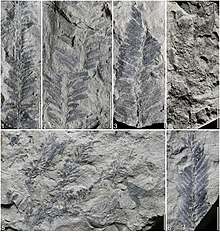Palissyales
| Palissyales Temporal range:
| |
|---|---|

| |
| Foliage of from the Late Triassic of Germany. | |
| Scientific classification | |
| Kingdom: | Plantae |
| Clade: | Tracheophytes |
| (unranked): | Gymnosperms |
| Division: | Pinophyta |
| Class: | Pinopsida |
| Order: | †Palissyales Doweld 2001 |
| Families and genera | |
|
See text | |
Palissyales are an extinct order of conifers, known from the Mesozoic. They are best known from the genus Palissya, which is found in Laurasia and Eastern Gondwana dating from the Late Triassic to Early Cretaceous. The only other confirmed genus of the family, known from the Late Triassic of the Northern Hemisphere. The genus from the Jurassic of Australia has also been tentatively considered a member of the order.[1] The cone of the best known genus Palissya is noted for its unusual construction, which is borne on a large bract (modified leaf), and consists of two parallel rows of ovules that run along the midline of the adaxial surface of the bract which are encased in cup-like structures formed by scales. The bracts are helically arranged around an axis, forming a compound catkin-like structure. The seeds are thin-walled were likely only viable for a short period of time, and were likely adapted to wind dispersal. Palissya has been considered in some aspects to be similar to some Paleozoic Voltziales, as well as Taxaceae and Podocarpaceae.[1]
Taxonomy[]
- Family: Palissyaceae Florin 1958
- Palissya Endlicher 1847 Late Triassic - Early Cretaceous (Rhaetian-Aptian)
- P. hunanensis Wang 2012 China (Hunan) Late Triassic (Rhaetian)
- P. sphenolepis (Braun 1843) Nathorst 1908 emend. Florin 1958 Germany (Franconia) Sweden (Stabbarp), Poland, Canada, Late Triassic-Early Jurassic (Rhaetian-Hettangian)
- P. harrisii C.R. Hill ex Pattemore & Rozefelds England (Yorkshire) Middle Jurassic (Aalenian)
- P. bartrumii Edwards 1934 New Zealand Middle Jurassic (Callovian) ?Late Jurassic (?Tithonian)
- P. elegans Parris et al. 1995 Australia (Victoria) Early Cretaceous (Valanginian)
- P. tillackiorum Pattemore & Rozefelds, 2019 Australia (Queensland) Early Cretaceous (Valanginian)
- Palissya sp. (Koonwarra) Australia (Victoria) Early Cretaceous (Aptian)
- P. antarctica Cantrill 2000 Antarctica (Antarctic Peninsula) Early Cretaceous (Aptian)
- Nathorst, 1886 Late Triassic (Rhaetian) Sweden, Greenland, Germany[2]
- Palissya Endlicher 1847 Late Triassic - Early Cretaceous (Rhaetian-Aptian)
- Family ?Knezourocarponaceae Pattemore, Rigby & Playford 2014
- ? Pattemore 2000
- Knezourocarpon narangbaensis Pattemore 2000 Queensland, Australia Early Jurassic (Pliensbachian-Toarcian),
- Knezourocarpon ovalis (Parris et al. 1995) Walloon Coal Measures, Australia, Middle Jurassic (Bathonian)
- ? Pattemore 2000
References[]
- ^ a b Pattemore, Gary A.; Rozefelds, Andrew C. (2019-12-01). "Palissya – absolutely incomprehensible or surprisingly interpretable: a new morphological model, affiliations and phylogenetic insights". Acta Palaeobotanica. 59 (2): 181–214. doi:10.2478/acpa-2019-0015. ISSN 2082-0259.
- ^ Van Konijnenburg-van Cittert, Johanna H.A.; Pott, Christian; Schmeißner, Stefan; Dütsch, Günter; Kustatscher, Evelyn (May 2021). "The Rhaetian flora of Wüstenwelsberg, Bavaria, Germany: Description of selected gymnosperms (Ginkgoales, Cycadales, Coniferales) together with an ecological assessment of the locally prevailing vegetation". Review of Palaeobotany and Palynology. 288: 104398. doi:10.1016/j.revpalbo.2021.104398.
- Conifers
- Prehistoric plant orders